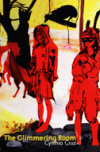The Glimmering Room
Have you listened to those early songs by Cat Power where the speaker lists the names of friends from her youth who grew up abused, turning to sex and drugs way too early in life? These poems by Cynthia Cruz are just like those songs. I’ve discovered that Chan Marshall (aka Cat Power) never quite had friends with those exact experiences or went through all that miserable hell herself. It doesn’t bother me too much either. The songs are still damn good. Powerful, moving, and quite evocative, the poems of Cynthia Cruz equally match all the grime and dark foreboding of Cat Power’s best licks. The Glimmering Room hits the same raw nerve, again and again:
Have you listened to those early songs by Cat Power where the speaker lists the names of friends from her youth who grew up abused, turning to sex and drugs way too early in life? These poems by Cynthia Cruz are just like those songs. I’ve discovered that Chan Marshall (aka Cat Power) never quite had friends with those exact experiences or went through all that miserable hell herself. It doesn’t bother me too much either. The songs are still damn good. Powerful, moving, and quite evocative, the poems of Cynthia Cruz equally match all the grime and dark foreboding of Cat Power’s best licks. The Glimmering Room hits the same raw nerve, again and again:
The shame of being
Seen consumes me.
And I fight back,
A landowner warding off
Leagues of feral thieves,
With fire, hand-held torch, burning back
The onslaught. In grade school,
Listening to the same Blondie song in my bedroom, over
And over for hours, days,
For years. No friends
But the one: silent, and sitting
In my head. Running laps around
The house for five, ten, fifteen
Miles, counting
Calories of everything put
Into my mouth—desperate to ward the onslaught
Off. Until I am nothing
But a body.
—“Diagnosis”
Cruz hits a steady stride for speaking out the frustrations of youth. Whether it was Blondie or Bowie, such angst-filled suffering by way of self-identification consumed just about everybody of her generation at some point; just as now Ke$ha and Lady Gaga fill similar gaps in suburban nightmare hellholes for many teenaged gritty-truth-yearning searchers. You are ultimately alone in life. You must deal with it.
These poems might have come straight from the notebook of the character Samantha Mathis plays in Pump up the Volume as would-be girlfriend to Christian Slater’s pirate-radio disc jockey character:
A slumland of the mind. You must know
How this body has failed me. Chronic,
In ripped red stockings and gold
Glitter ballet leotard.
White headscarf with the rising sun, and holding
My stuffed Snoopy. I have this fever,
I can’t tell anyone. But I promise I will
Love anyone
Who will talk to me.
—“The Great Destroyer”
The opportunity for readers to engage in emotional identification runs rampant throughout this book. What’s lacking is any sense that there are far more diverse and distant worlds from the ones conveyed by these poems. The speaker went through some serious shit, but apparently now has moved on or else is capable of somehow gaining lots of free time and mature headspace to reflect on all the horrible things which plagued her adolescence. There’s an imbalance that never gets sorted out, let alone addressed; the state of mind is raw, yet the craft is miraculously perfect.
The clear precursor here is Sylvia Plath. Yet Plath was literally living through what her poems express while still using her art to attempt to keep the greatest of personal pain at a distance. Cruz appears to usually be working in the opposite direction:
Daddy, I am spit
Pasting junk and shit into glittering
Black pink pearls and beads of apathy.
Track down the pony
Trapped on the carnival-like barge
Lit in key lime green like a California
Ferris wheel to the Rhine,
Back to my Germany
Where this awful song began.
Give me back my Ritalin.
Give me my shock
Of medicine. Make sure my spine
Is still living. Mommy,
Slip the black eel
Back in the sealed aquarium.
Christmas time in Germany,
Mommy’s got me laced in some French
Magic. Some burlesque, some circus, and some queer,
Candy ass. Now we can pretend I am
Daddy’s blonde princess. Give me my
Medicines, Mommy, so I can forget.
—“Strange Gospels”
These poems do work well up to a point. For Cruz, and no doubt for many readers, this point may be as far as they look for poems to go. Cat Power’s latest album, Sun, veers off into some new territory. The music is much spacier than ever before, filled with bright light chasing away what little gloom takes a chance at appearing. If anything, it approaches something similar to a not-as-talented shot at something like Pet Sounds by the Beach Boys. Chan Marshall, it appears, appreciates the value in turning a corner and keeping things going. Art itself demands nothing less of the artist: at some point, no matter how eloquent the display of gratuitous details recounting past trials and hardships of youth (whether real or imagined), it isn’t enough to compel the audience up on Mount Parnassus. Cruz is on a corner, but the question remains open as to whether she’s going to turn down the next street and keep going.





